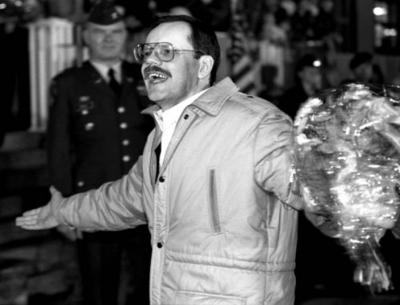American journalist Terry Anderson, who was kidnapped by Islamist militants in Lebanon in 1985 and held hostage for six years, passed away at the age of 76 on Sunday, according to the Associated Press. Anderson was the bureau chief of the Associated Press in Beirut and the longest-held Western hostage in Lebanon. He was held by Islamic Jihad in Lebanon from 1985 to 1991. He died at his home in Greenwood Lake, New York, due to complications from recent heart surgery, as reported by his daughter, Soleme Anderson.
A former Marine, Anderson became a symbol of the dangers faced by foreign journalists and other Westerners in Lebanon during that tumultuous period in the country. After his release, Anderson wrote a memoir titled "A Lion's Den," which became a bestseller and recounted his ordeal at the hands of the Iran-backed Islamic Jihad.
His daughter was born shortly after his kidnapping, and due to his captivity, he only met her when she was six years old. Anderson, who hailed from Ohio, served six years in the Marine Corps, fought in Vietnam, and then returned to the U.S. to study journalism. The Associated Press reported that he worked for them in the U.S., Japan, and South Africa before moving to Lebanon in 1982 to cover the Israeli invasion, remaining there as the country descended into chaos.
After his release, Anderson returned to the U.S. and taught at several universities before retiring about a decade ago. In 1991, the newspaper Al-Nahar wrote about Anderson's liberation, quoting: "On March 16, 1985, the chief correspondent of the Associated Press in the Middle East, Terry Anderson, realized he had made a terrible mistake, and now I would pay the price for ignoring the advice to leave Beirut, which was emptied of foreign correspondents by war. Returning from a tennis match with a friend, the American journalist found himself in the back of a truck that took him to captivity, making him the foreigner who spent the longest time held hostage in the West."
The kidnapping was not Anderson's first attempt; it followed a failed attempt the night before: "I was a fool! Could they not try to kidnap me again the next day? The moment I was pulled from my car, I realized it would be long and bad," based on his field observations of the "wave" of kidnappings of foreign hostages marking the later phases of the Lebanese war, and his belief that the situation "was political and not about ransom to return home." He regretted not heeding his agency's advice to leave "because I was convinced the time wasn't right and it was important to cover what was happening. Certainly, I regretted it because no one wants to go through that experience."




